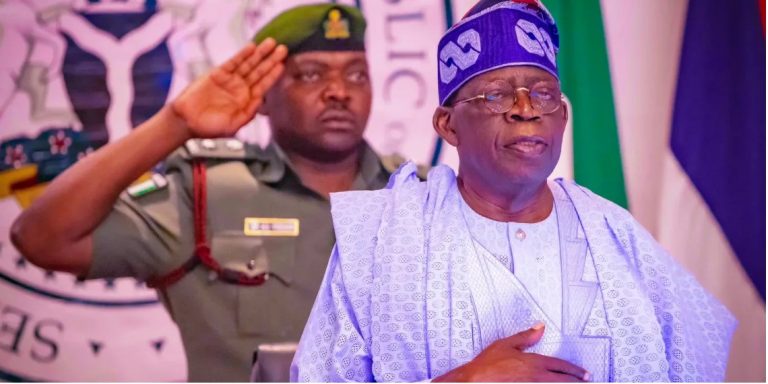
President Bola Ahmed Tinubu’s recent address in reaction to widespread protests against hunger and bad governance demonstrates a complex interplay of articulatory discourses that are relevant to Nigeria’s current socioeconomic reality. The protests, which erupted in response to growing living costs and broad dissatisfaction with government policies, forced Tinubu to accept the people’s problems while asking for a stop to demonstrations and a shift to discussion.
Acknowledgment of Grievances
Tinubu’s address prominently acknowledges the demonstrators’ concerns. He said, “I heard your voices loud and clear.” I comprehend the anguish and fury that drive these protests.” This recognition is an attempt to acknowledge citizens’ anger, particularly among youth, who are disproportionately affected by economic challenges.
Register for Tekedia Mini-MBA edition 19 (Feb 9 – May 2, 2026): big discounts for early bird.
Tekedia AI in Business Masterclass opens registrations.
Join Tekedia Capital Syndicate and co-invest in great global startups.
Register for Tekedia AI Lab: From Technical Design to Deployment (next edition begins Jan 24 2026).
Call for Unity and Dialogue
The President stressed the importance of Nigerian unity, calling all citizens to work together to transform the country’s future: “Nigeria requires all hands on deck”. This call to collective action is a strategic rhetoric aimed at instilling a sense of national cohesion amid escalating tensions. Tinubu hopes that by facilitating conversation, he can build a platform for resolving protesters’ concerns while reducing the possibility of future upheaval.
Emphasis on Law and Order
Tinubu’s emphasis on keeping peace and order is another key component of his message. He warned against using the protests for violent ends, saying, “The law will catch up with you”. This claim emphasizes the government’s commitment to law enforcement while also showing a defensive posture in response to accusations that security agents used excessive force during the protests.
Economic Measures and Future Vision
Tinubu’s speech detailed his administration’s economic objectives, such as infrastructure development and student loan schemes. However, critics believe that these initiatives fail to address the demonstrators’ immediate concerns, such as the resumption of fuel subsidies and the critical need for relief from inflation, which has reached catastrophic levels. This disparity between declared government policies and the pressing demands of the population demonstrates a fundamental governance difficulty.
Comparison to Previous Responses
Acknowledgment of Grievances
Tinubu’s Approach: In his speech, Tinubu acknowledged the existence of grievances among the protesters, stating, “I have heard your voices loud and clear” and urging for dialogue to address these issues. This marks a shift from previous administrations that often dismissed protests or labeled them as politically motivated.
Previous Responses: Historically, responses from Nigerian leaders, such as during the EndSARS protests, often involved outright denial of the issues raised or attempts to discredit the protesters. For instance, former President Muhammadu Buhari faced significant backlash for his perceived indifference to the demands of young Nigerians during the EndSARS movement.
Call for Dialogue
Tinubu’s Emphasis: Tinubu called for the suspension of protests to create room for dialogue, stating, “Under the circumstances, I enjoin protesters and the organisers to suspend any further protest and create room for dialogue”. This attempt at fostering communication contrasts with previous tactics that relied more on the forceful dispersal of protests rather than engagement.
Historical Context: Previous leaders often resorted to heavy-handed tactics, including police brutality, to quell protests, which further escalated tensions. The EndSARS protests are a notable example where the government’s failure to engage led to violent confrontations.
Content of the Speech
Economic Measures: Tinubu outlined various economic initiatives and reforms his administration has undertaken, yet critics argue that these do not directly address the immediate concerns of the protesters, such as the reinstatement of fuel subsidies and urgent economic relief. This lack of specificity in addressing protesters’ demands has been a common critique of governmental speeches in the past.
Previous Leaders’ Speeches: Similar to Tinubu, past leaders often highlighted achievements without addressing the pressing issues at hand. For example, Buhari’s speeches during protests frequently focused on security and economic stability without acknowledging the specific grievances of the youth.
Specific Reactions to the Speech
Protest leaders and analysts have expressed displeasure, claiming that Tinubu’s speech lacked sincerity and failed to address the citizens’ immediate demands. Deji Adeyanju, a renowned protest leader, highlighted that the government must first listen to the people’s views and address their demands before engaging in conversation. Human rights lawyer Femi Falana also attacked the address, urging swift action on the protestors’ demands and condemning the government’s treatment of the protests.



